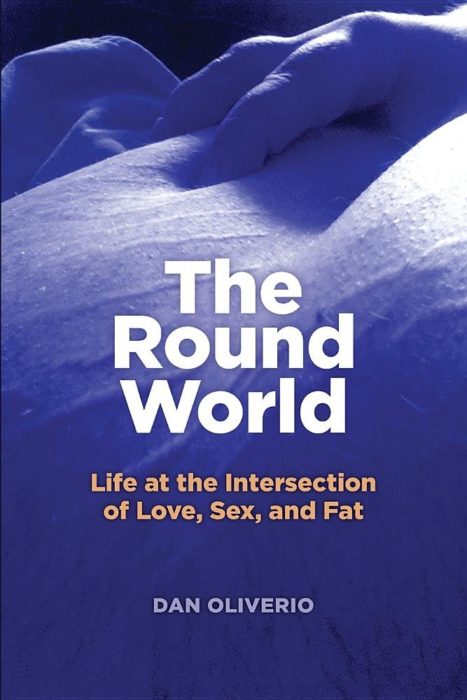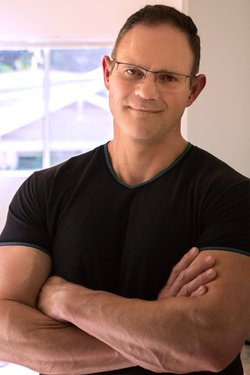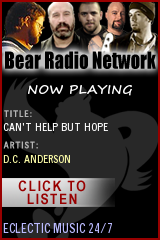Life In the Round World:
Author Dan Oliverio explores relationships at the intersection of love, sex, and fat
An interview by Ron J. Suresha
Dan, please tell us about your background as a speaker and educator and how you became a fat activist.
You know, I can understand why sometimes I’m called an activist, but all I’m really after is a world where people are free to be who they are and love what they love. And sometimes who they are or what they love is fat.
For the last eight years, I’ve been writing and speaking about the issues that come up for people when obesity intersects with sexuality. So, that includes dating, relationships, body image, self-empowerment, and sexual kink. I’m not a psychotherapist, but my clients and seminar participants tell me that I’ve been more helpful to them in one session than weeks of psychotherapy or couples counseling. I’ve talked to hundreds of men and women over the years, and people tell me I have a unique insight into the challenges that fat people and their admirers face. And a lot of traditional therapy doesn’t address our unique dating and relationship issues because most therapists know nothing of the round world, as I call it. Even many gay therapists have a blind spot when it comes to fat and certain sexual kinks.

Why did you write The Round World and what does the title signify?
The Round World is my name for the place where fat people and their admirers interact. As the subtitle explains, it’s about Life at the Intersection of Love, Sex, and Fat. Many of us have a strong attraction to obese partners, but what’s it like to have an attraction that the rest of the world finds disgusting, unhealthy, and quite literally unspeakable? On the other hand, what’s it like to be a fat person and be admired for a quality that you may not like about yourself and wish you could change? But in a greater sense, the book isn’t just about being fat or having a sexual attraction to fat. The book is about loving yourself no matter what your size or sexual desires.

I sense your book will appeal to men, women, and others regardless of size, or sexuality. But are sex and gender completely irrelevant in considering the personal and social issues that fat folks experience?
People often say to me, “Isn’t beauty only skin deep? Isn’t the person more important than the packaging?” And that sounds so great, you know? And we really wish that were true. But if we really believed that, then we wouldn’t care whether we dated a man or a woman, or whether they were gay or straight. And not only do we care, but we feel justified in caring: No one today would tell a gay man to marry his favorite gal-pal because, “Isn’t the person more important than the packaging?” No one would tell a straight woman to get over her bizarre fetish to date only people who have a penis. We accept sexuality and sexual orientation as valid parameters for our romantic relationships. But what if there were other sexualities beyond just gay/straight? What if gender were not the top category used for eligibility in a romantic relationship?
In the book, I make the case that there is such a thing as a fatsexual, someone who considers obesity a primary sexual characteristic. Now, does this mean that gender or sexual orientation is irrelevant? No, but there are a lot of people who don’t see their partner’s gender as a deal-breaker when it comes to dating so long as their partner is fat. Even in my own case, I have never dated a woman, and I consider myself exclusively homosexual. However, when I lead seminars at BBW [big beautiful woman] events, my jaw drops looking at the size and stunning beauty of some of these women. Now, I’m not going to start dating fat women, but I have to tell you, for an exclusively homosexual man, those feelings are kind of surprising! I’ve never had that reaction to a thin woman.
So some people have a sexual attraction to size that’s bigger than gender (pardon the pun). But, as a bisexual men’s activist myself, I can say for certain that there are sexualities beyond gay and straight. Many bi / poly /pansexual men and women, and certainly trans folks, do not care whether they date a man, woman, or some gender that altogether different.
Yes, but the fatsexual cares about fat.
Can you see the struggles of Fat people as a Queer issue, meaning, are there aspects of being fat that intrinsically relate to GLBTQ life and/or Queer Studies, for example, the politics of liberation, or body shame?
Historically, fat has been seen as mostly a woman’s concern. In fact, one of the seminal books on the subject is titled Fat is a Feminist Issue. If a university teaches Fat Studies, it’s usually part of the Department of Women’s Studies. But if you were to judge by the few books and articles about fat men, you might conclude that either there are no fat men or that being fat is no big deal for men, which of course is far from true.
The Round World is the first book to explore obesity from the perspective of the people who find it erotic and seek fat people as romantic partners. It transcends all the little boxes of male, female, gay, straight, and so on. To do that, I tell a lot of stories about myself and people whom I’ve met over the years. The book is a kind of travelogue, where you’ll meet a wide range of people with different backgrounds who all live in this place I call the Round World.
Now, of course there are differences when we talk about men and women, or about gay and straight, but really the issues are the same when it comes to a sexual attraction to fat. People just have different ideas about what or who is to blame. I lead seminars to both gay and straight groups, and it’s amazing how the straight groups (Big Beautiful Women and Fat Admirers) have a tendency to assume their conflicts arise because of male/female dynamics while the gay men (Chubs/Chasers) tend to assume their conflicts arise because of being fat. And both groups are quick to blame everything on men and so-called male sexuality. The lesbians, of course, tend to blame so-called female sexuality.
To address your question more directly, I do think there is a historical parallel between being queer and being or liking fat. In the book, I make many comparisons between what we used to think about homosexuality and what we currently think about obesity. Fat people and chubby chasers often face the same social stigmas and scientific prejudices that gay people did in the 1950s and ’60s. For example, chubby chasers today often don’t realize the depth and strength of their desires for a fat partner until they’re already in a relationship with someone who isn’t fat. What these couples go through—the language they use and the emotions they feel—is exactly the same as a 1960s couple trying to understand how their spouse could be attracted to someone of the same gender. The guilt, longings, shame, confusion, and fears are the same.
Here’s another parallel. In the 1950s, the medical profession used to consider homosexuality a mental illness to be cured or at least treated. Fifty years later, however, no credible doctor would diagnose a patient’s illness as homosexuality.
I suggest that science is coming to look on obesity the same way—less like a disease to be eradicated and more like a complex metabolic process that is poorly understood. Actually, I’d say the state of science with obesity today is where science was about homosexuality in about 1980—I don’t mean in terms of social acceptance. I mean medically with respect to health and morbidity. People forget that we used to think of homosexuality as an unhealthy lifestyle that led only to an early and lonely death. At one time that was a well-documented medical fact.
Today, we have the same sort of medical facts about the supposed morbidity of obesity, despite a vast array of evidence to the contrary. It’s something I call fat fundamentalism—an unchanging dogma based on the exclusion of all other contrary evidence or arguments. But as with the medical view of homosexuality in 1980, the view of obesity today is evolving.
What do see as the next phase in the state of Fat Liberation now in this country and in the world?
I think if people are to have more freedom and power in their lives, we need to give up making each other wrong. So much of the dialogue in the world today is cast in negative language. We see on Facebook all the time click bait like “7 Things You Should Never…”
Just a few days ago there was one of those that seemed to drive everyone in the “Facebear community” completely insane, “5 Harmful Lies About Gay Bears That Need to Stop.”
Exactly. And we attack each other with these lists, telling one group what they shouldn’t do or say or think about another. While the intention is to bring understanding, the result is to bring acrimony. You can’t create understanding through censorship and telling people their ideas are unacceptable. You only drive the conversation—about race, fat, gender, money, whatever—deeper into taboo. So fewer people are comfortable talking about it, and more people end up angry about it. We’re all in this together. The reason gays have so many straight allies is that our straight friends recognize that the same ideology that keeps gay people in the closet also keeps straights in restrictive gender roles and unhappy marriages. My work is about everyone and anyone making peace with their body and their sexual desires. Believe me, most of the so-called thin oppressors have the same issues with their bodies that many fat people do. Some straight male chubby chasers have the same feelings of guilt and inadequacy as A-gay circuit boys.
The next step I suppose is transcending what I call the Taboo Conversation. In the last section of my book, I talk about what the Round World has to do with people who aren’t fat and who don’t have an attraction to fat. I think that when we talk about any taboo subject—about race, money, gender, sexuality, cancer, disability, and so on—we’re actually having the same conversation. The topics may vary by time or society, but all conversations about a taboo share three basic characteristics, which I discuss in the book.
Please identify the three basic characteristics of taboo conversations.
Well, that would take a while to explain. But I think the salient point is this: the taboo conversation is based in identity, which is why we get so upset. Why it feels so personal. In fact some of us live in a taboo conversation—or more than one. That’s not the same as being a minority or marginalized group. For example, when the taboo is money, both a rich person and a poor person might live in that taboo conversation. I’m a fit bodybuilder, but I live in the taboo conversation about fat. Only when we transcend the taboo conversation can we have authentic conversations about what’s really important to us and who we are. I don’t believe in an us-against-them struggle. We’re all in this together.
Well put, Dan. Thanks for your time introducing us to your new book, The Round World, and best of luck with it.
My pleasure.
~
Explore The Round World at Dan Oliverio‘s website. The Round World is releasing June 30th from Antrobus Group.
This is the full interview which is excerpted on Huffington Post.


